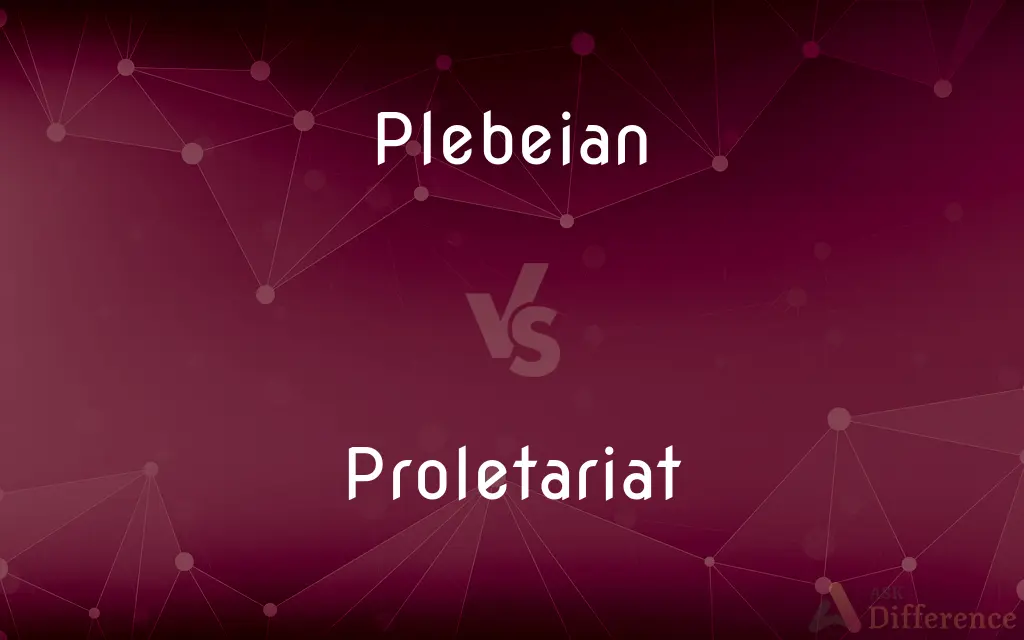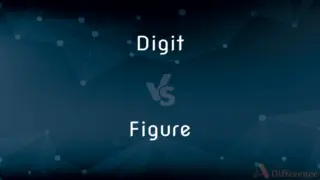Plebeian vs. Proletariat — What's the Difference?
By Fiza Rafique & Maham Liaqat — Updated on April 25, 2024
Plebeians were the general citizenry in ancient Rome, excluding the elite patricians, with varied economic statuses, whereas proletariat refers to the working class in modern industrial societies, specifically those who lack their own production means.

Difference Between Plebeian and Proletariat
Table of Contents
ADVERTISEMENT
Key Differences
Plebeians in ancient Rome encompassed a broad range of the populace from wealthy merchants to poor farmers, united not by wealth but by their non-aristocratic status. On the other hand, the proletariat class, a concept popularized by Karl Marx, specifically includes workers in industrial societies who do not own the means of production and whose economic value comes from their labor.
The plebeians, despite their broad socio-economic spectrum, shared common legal and social limitations in contrast to the patricians, Rome’s hereditary aristocracy. Whereas, the proletariat is defined not by hereditary status but by their role in the economy as laborers who sell their labor to survive, often facing exploitation under capitalist systems.
Historically, plebeians could sometimes achieve wealth and influence, especially during the later periods of the Republic and the Empire, when legal reforms began to blur the lines between them and the patricians. Conversely, the proletariat class is characterized by a lack of property and capital, which keeps them economically disadvantaged and often politically powerless in a capitalist society.
In terms of political struggle, plebeians fought for and gradually gained rights within the Roman Republic, such as the establishment of the office of the Tribune, which protected their interests. The proletariat, however, has been central to Marxist theory, which sees their struggle for rights and better working conditions as a catalyst for revolutionary change, aiming to overthrow the capitalist system.
While plebeians could own property and even slaves, marking a clear distinction from some of the lower classes in other ancient societies, the proletariat is distinctively marked by their position as workers who own no substantial property apart from their labor power.
ADVERTISEMENT
Comparison Chart
Definition
Common citizens of ancient Rome, not part of the hereditary aristocracy
Working class in modern industrial societies who do not own production means
Economic Status
Varied, from wealthy merchants to poor farmers
Generally lacks access to property and capital, reliant on selling labor
Political Influence
Initially limited, grew over time with new rights and offices
Historically limited, with movements often pushing for systemic change
Role in Society
Broad, including various roles within Roman society
Specifically tied to industrial production and labor
Historical Context
Specific to ancient Roman society and its structure
Emerged with industrial capitalism and central to Marxist theory
Compare with Definitions
Plebeian
Pertains to commoners with varied economic statuses but common legal restrictions.
Despite being a wealthy merchant, he remained a plebeian and lacked certain privileges.
Proletariat
Historically linked to struggles for better wages and working conditions.
The proletariat movement has often led to significant labor reforms.
Plebeian
Used historically to denote non-aristocratic individuals.
The plebeian assembly was a legislative body where the common people of Rome could voice their concerns.
Proletariat
Refers to the working class in a capitalist society, particularly those in industrial sectors.
Marxist theory discusses the proletariat's role in overthrowing the capitalist system.
Plebeian
Describes someone from the lower social classes in Rome, often without significant political rights.
Plebeian protests led to the creation of the Tribune, an office that safeguarded their interests.
Proletariat
Defines those who have their labor as their primary economic asset.
The proletariat is seen as the driving force behind economic production but benefits the least.
Plebeian
A member of the general citizenry in ancient Rome, excluding the elite patricians.
As a plebeian, he was not eligible to become a senator in the early Roman Republic.
Proletariat
Central to Marxist political theory as the class destined to lead revolutionary change.
The proletariat's awareness of their exploitation is key to the concept of class consciousness.
Plebeian
Often refers to someone lacking noble lineage in ancient contexts.
Plebeian families played a crucial role in the cultural and economic life of Rome.
Proletariat
The class of workers who do not own the means of production and must sell their labor to survive.
The rise of the proletariat was significant in the industrial revolution.
Plebeian
Of or relating to the common people of ancient Rome
A plebeian magistrate.
Proletariat
The proletariat ( from Latin proletarius 'producing offspring') is the social class of wage-earners, those members of a society whose only possession of significant economic value is their labour power (their capacity to work). A member of such a class is a proletarian.
Plebeian
Of, belonging to, or characteristic of commoners.
Proletariat
The class of industrial wage earners who, possessing neither capital nor production means, must earn their living by selling their labor.
Plebeian
Unrefined or coarse in nature or manner; common or vulgar
Plebeian tastes.
Proletariat
The poorest class of working people.
Plebeian
One of the common people of ancient Rome.
Proletariat
The propertyless class of ancient Rome, constituting the lowest class of citizens.
Plebeian
A member of the lower classes.
Proletariat
The lowest class of society; also, the lower classes of society generally; the masses.
Plebeian
A vulgar or coarse person.
Proletariat
(Marxism) Wage earners collectively, excluding salaried workers; people who own no capital and depend on their labour for survival; the working class, especially when seen as engaged in a class struggle with the t=the capital-owning class.
Plebeian
A member of the plebs, the common citizens of ancient Rome.
Proletariat
The lowest class of citizens, who had no property and few rights, and were regarded as contributing only their offspring to the state.
Plebeian
A commoner, particularly (pejorative) a low, vulgar person.
Proletariat
The indigent class in the State; the body of proletarians.
Plebeian
(historical) Of or concerning the plebs, the common citizens of ancient Rome.
Proletariat
A social class comprising those who do manual labor or work for wages;
There is a shortage of skilled labor in this field
Plebeian
Of or concerning the common people.
Plebeian
Common, particularly (pejorative) vulgar, crude, coarse, uncultured.
Plebeian
Of or pertaining to the Roman plebs, or common people.
Plebeian
Of or pertaining to the common people; vulgar; common; as, plebeian sports; a plebeian throng.
Plebeian
One of the plebs, or common people of ancient Rome, in distinction from patrician.
Plebeian
One of the common people, or lower rank of men.
Plebeian
One of the common people
Plebeian
Of the common people of ancient Rome;
A plebeian magistrate
Plebeian
Of or associated with the great masses of people;
The common people in those days suffered greatly
Behavior that branded him as common
His square plebeian nose
A vulgar and objectionable person
The unwashed masses
Common Curiosities
How did the economic status of plebeians and proletariats differ?
While plebeians could belong to various economic levels, including wealthy merchants, proletariats typically do not own significant property and are economically disadvantaged.
How did plebeians differ from patricians?
Unlike patricians, plebeians were not part of the hereditary aristocracy and often had fewer rights and social privileges in early Roman society.
Did plebeians have political power in ancient Rome?
Initially, plebeians had limited political power, but over time they gained significant rights, including the establishment of the Tribune to protect their interests.
What historical changes affected the plebeians?
Throughout the Roman Republic and Empire, plebeians saw a gradual increase in rights and social mobility, especially through legal reforms.
How did plebeians impact Roman culture?
Plebeians greatly influenced Roman culture, contributing to its commercial, military, and social developments through their diverse roles.
What defines a plebeian in ancient Rome?
Plebeians were the common citizens of ancient Rome, distinguished from the patrician class by their lack of aristocratic heritage, covering a wide range of economic statuses.
What is the proletariat?
The proletariat refers to the working class in modern industrial societies, characterized by their lack of ownership of production means and reliance on selling labor.
What role does the proletariat play in Marxist theory?
In Marxist theory, the proletariat is seen as the key class that can initiate societal change through revolution against capitalist systems.
Why is the proletariat considered important in discussions of capitalism?
The proletariat is central in capitalism as they are the majority class that produces wealth through labor but does not benefit proportionally from their production.
Can plebeians be considered similar to the proletariat?
While both groups include non-elite members, plebeians had a broader social spectrum, and their challenges were tied to hereditary rights, unlike the economic conditions defining the proletariat.
What are the revolutionary potentials of the proletariat according to Marxist theory?
According to Marxist theory, the proletariat has the revolutionary potential to overthrow the capitalist system and establish a classless society.
How do plebeian and proletariat struggles differ?
Plebeian struggles were primarily against hereditary legal restrictions, whereas proletariat struggles are against economic exploitation in a capitalist society.
What does the future look like for the concept of the proletariat?
As global economies evolve, the concept of the proletariat continues to adapt, particularly with changes in labor markets, technology, and economic structures.
What are some examples of proletariat movements?
Historical proletariat movements include the labor movements in the 19th and 20th centuries, which fought for better wages, working conditions, and labor rights.
Were plebeians involved in the military of ancient Rome?
Yes, plebeians played crucial roles in the Roman military, often serving as soldiers in the legions.
Share Your Discovery

Previous Comparison
Nursing vs. Medicine
Next Comparison
Digit vs. FigureAuthor Spotlight
Written by
Fiza RafiqueFiza Rafique is a skilled content writer at AskDifference.com, where she meticulously refines and enhances written pieces. Drawing from her vast editorial expertise, Fiza ensures clarity, accuracy, and precision in every article. Passionate about language, she continually seeks to elevate the quality of content for readers worldwide.
Co-written by
Maham Liaqat













































